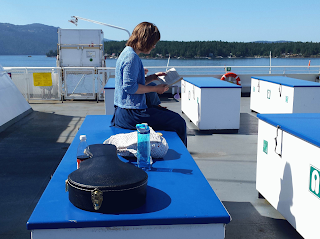History is more than a little
confusing. For example, let's try to solve the mystery of who
discovered Canada.
I typed that question into a
search engine. It spat back: Jacques Cartier in 1534. Huh?
What was that poem...? Oh, yeah, In 1492 Christopher Columbus sailed the ocean blue. But he thought he'd discovered India.
When I typed in what did
Leif Eriksson discover I was directed to biography.com
'Leif Eriksson was on his
way back home
to Greenland...when he
sailed off course
and landed at what is now
Nova Scotia,
which he called Vinland.
This account
comes from the Icelandic
Eriks saga.
Another account, the
Groenlendinga saga,
says he learned of Vinland
from an Icelandic
trader who had been there
14 years earlier...
By most accounts, Eriksson
sailed from
Greenland to Norway in
1000.'
That's 534 years before
Jacques Cartier.
I typed in what does Canada
mean?
Wikipedia informed me
that...
'The name of Canada has
been in use since the earliest European
settlement in Canada,with the name originating
from a Saint-Lawrence Iroquoian
word kanada
(or canada) for
“settlement”, “village', or “land”.'
Isn't that interesting? Maybe Canada didn't need to be discovered. Maybe it was never lost. A few white people were but not Canada.
So imagine, I'm at home on
Mayne Island. It's a sun-filled day and say I'm outside working on
the yard. A tourist from Vancouver Island shows up.
“Wow, it's a good thing I
came,” he tells me. “You were lost. Here let me help you.” He
moves into my house.
I'm forced to move down into
the basement.
He tells me, “I like it
here. I mean, it's pretty and all that but what do you do about this
and this and this.”
So I teach him some tricks
to make adjusting to rural life much easier. I think we're friends.
One day, he says, “You
know you look really cramped, living in the basement.”
I think how nice of him to
notice.
He says, “I'm sure you'll
be much happier living in Victoria. We'll teach you how to be a city
person. It'll be a much better life than the one you had on Mayne
Island.”
With me out of the way, he's
free to treat my island any way he wants. He builds fast food
restaurants and paves over flowerbeds for parking lots. He pollutes
the water and the air.
Now, of course, none of that
will happen. I'm just a white woman wondering what it's like to be
Aboriginal. All I can do is wonder. But Thomas King knows and he has
opened my eyes.
The Inconvenient Indian
is not a easy read, but it is a necessary one. And thanks to King's
wit, it is doable.
He discusses three types of
Indians.
'Dead Indians are
dignified, noble, silent, suitably garbed. And dead. Live Indians are
invisible, unruly, disappointing.
And breathing. One is the
romantic reminder of a heroic but fictional past. The other
is simply an unpleasant, contemporary surprise.' (p.66)
'Legal Indians are those
Indians who are recognized as being Indians by the Canadian
and U.S. governments.'(p. 68)
'North America hates
the Legal Indian... The Legal Indian was
one of those errors in judgment that North America made
and has been trying to correct for the last 150 years.' (p. 69)
I
like how King answers the question of what do Natives want. It speaks
to the diversity of a people. Aboriginals are a diverse people. It
was the white man who lumped them all together under one
title—Indian. King makes this point through out this book. Whites
made the classification. Aboriginals did not.
Some
may say the abuses done to Aboriginals is old news and they should
just get over it.
King
replies to this comment...
'[A]n
examination of the past...can be instructive.It
shows us that there is little shelter and little gain for
Native peoples in doing nothing.' (p. 265)
If
Native people want sovereignty and self-determination, they will have
to fight for it, King concludes.
Favourite
quote: 'The fact of Native existence is that we live modern lives
informed by traditional values and contemporary realities and that we
wish to live those lives on our terms.' (p. 266)
If you would like to gain
better understanding of the Aboriginal experience in North America, I
highly recommend...
Next post: Where's the Head (a short story)
Sharing my author journey...
On Mayne Island, The Inconvenient Indian was not only a book but a challenge. A challenge issued...





